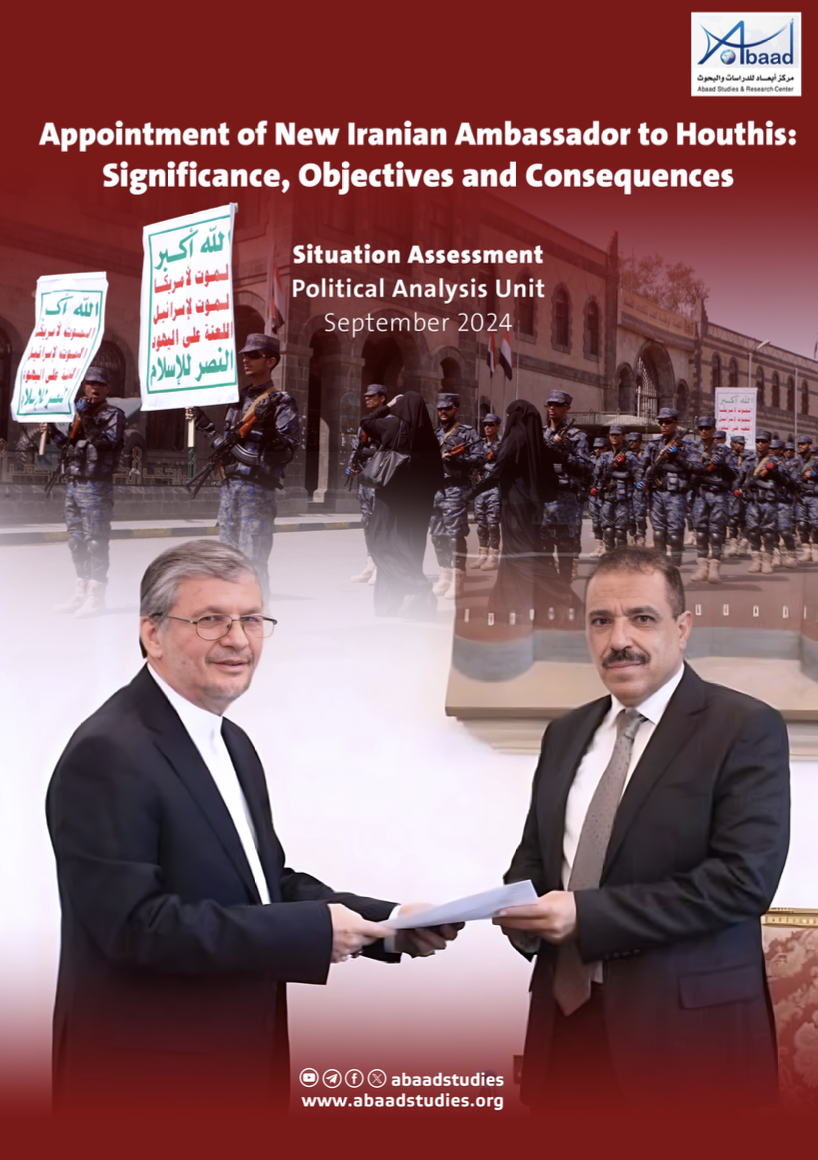Appointment of New Iranian Ambassador to Houthis: Significance, Objectives and Consequences

Introduction
Recently, Iran appointed a new ambassador to the Houthi group in Sana'a, ending a three-year vacancy following the death of the previous ambassador, Hassan Irlu. This move comes at a critical time in the region, as Iran faces numerous internal and external challenges.
This analysis explores the contexts, reasons, and consequences of this development, shedding light on Iran’s potential objectives, the messages they aim to convey and to whom, as well as the expected consequences both within Yemen and regionally.
First: Context and Significance of Iran’s Move:-
In recent years, the Middle East has witnessed significant changes in the relationships and interactions among regional actors. One of the most notable developments has been the rapprochement between Iran and Saudi Arabia, culminating in a Chinese-mediated agreement to restore diplomatic relations in March 2023. This rapprochement represents a shift in the approaches of both countries, especially after decades of competition and proxy conflicts in various regions, particularly in Yemen.
In this situation, the appointment of a new ambassador to the Houthi group may indicate underlying tensions in Iran-Saudi relations, suggesting that the rapprochement has not achieved the tangible progress both parties had hoped for. It could also imply a potential setback in the efforts to restore the relations between the two nations.
The ongoing war in Gaza represents a significant event that poses severe risks for the region and the interactions among its actors. This conflict has escalated tensions, putting Iran and its allies at an unprecedented risk of direct confrontation with their adversaries. Each day proves that the situation has the potential to rapidly escalate into open and comprehensive warfare. Therefore, there is a pressing need to strengthen solidarity among the members of the resistance axis according to the principle they refer to as “unity of fronts."
Iran's allies have been drawn into varying degrees of involvement in the Gaza conflict, with the Houthis standing out as particularly bold further than the other members of the resistance axis. Their intervention has been more effective and impactful, placing them under greater pressures and risks. While this situation necessitates support for the Houthis, it has also earned them widespread popularity in the region. Additionally, it has instilled greater self-confidence in the Houthis, bolstering their independence from Iran and the resistance axis. This development has raised Tehran’s concerns that the Houthis may become self-assured enough to deal with Iran as equals rather than as proxies.
Notably, Iran delayed appointing a new ambassador to the Houthis for three years following the death of the previous ambassador, Hassan Irlu. This could be perceived as a form of neglect and helplessness by Iran, at least as the Houthis might have felt. The Houthis' involvement in the conflict has highlighted their value to Iran in confronting Western powers, whose response to protecting international navigation and their interests against the Houthis has been weak and disjointed. This realization highlights the misstep of not appointing a replacement ambassador sooner and the need to rectify this situation.
Furthermore, the conflict in Gaza has further strained Iran's relations with Saudi Arabia. This tension is partly due to Saudi Arabia's lukewarm stance towards the conflict and its failure to exert pressure on Israel or provide assistance to the Palestinians. Another significant factor is the potential normalization of relations between Saudi Arabia and Israel, which threatens the fundamental principles of the "resistance axis." Consequently, Tehran sees an opportunity to pressure and threaten Saudi Arabia, with the Houthis serving as effective actors to achieve this.
The appointment of a new Iranian ambassador to the Houthis comes at a time when international pressure on Iran is increasing, particularly concerning its nuclear program and its role in regional conflicts. This development occurs amidst escalating competition between the United States, China, and Russia, reflecting itself in the region and presenting both opportunities and risks for regional powers. Like others, Iran aims to strengthen its position, capitalize on the opportunities arising from these shifts, as well as confront explicit and potential threats. Enhancing its diplomatic presence in Yemen demonstrates that Iran remains a key player capable of influencing the course of events in the region, thereby becoming a credible force in the eyes of new competitors to Western powers.
In the Yemeni context, Iran realizes that the conflict will eventually come to an end. Amid ongoing efforts to find a political solution to the conflict, it is important for Iran to have a significant hand in any future settlement. Having an ambassador in Sanaa, close to the Houthi decision-makers, will ensure closer and more precise communication about ongoing developments, providing greater opportunities to influence and steer events. This step indicates that Tehran remains committed to playing a key role in shaping Yemen's political future and maintaining its influence there as well as in the broader region. Thus, Iran finds itself driven from all directions towards the Houthi group.
In a broader context, this move indicates the challenging conditions Iran is currently facing. The circumstances are far from favorable, and the developments around it are not in its best interest, placing significant pressures on the country. Through this step, Iran reaffirms its commitment to maintaining its positions and policies unchanged, demonstrating its steadfastness and dedication despite its rapprochement with its neighbors and its need to lift imposed sanctions and improve its deteriorating economic situation.
Second: Iran's Objectives behind Appointment a New Ambassador
Based on the aforementioned contexts and circumstances, several objectives can be inferred from Iran's recent move:
- Strengthening Solidarity within the "Resistance Axis"
Iran views itself as the leader of the "Resistance Axis" in the region, a leadership that grants it significant influence on the regional stage. By appointing an ambassador in Sana'a, Iran aims not only to enhance its relations with the Houthis or reaffirm its support for them but also to curb their inclination towards independence. This move is intended to mitigate any tendencies within the Houthis to distance themselves from Iran, especially given the recent media and popular gains they have achieved through their bold involvement in the conflict alongside Palestinians against Israel. Additionally, this step underscores Iran's commitment to supporting its allies in the region as a whole.
- Influencing Peace Negotiations in Yemen
Iran seeks to influence the course of events in Yemen and have a significant role in any future political settlement that aligns with its regional interests. This would be challenging without a high-level Iranian diplomatic presence in Sana'a.
- Exerting Pressure
Through this move, Iran aims to exert pressure on Saudi Arabia and the Gulf states, warning them against adopting unfriendly policies or actions that harm Iran and its allies. It also aims to pressure the international community, cautioning against escalation or actions detrimental to Iran and its allies.
- Sending Messages to Allies and Adversaries
Iran, through this step, sends multiple messages in different directions: first, to its allies; second to its adversaries such as Saudi Arabia and the United States; third to the international community; and finally to its internal community.
- To Regional Allies: Iran, by this move, intends to convey a message to its regional allies that Tehran remains a reliable partner, committed to standing by them in the face of common challenges and dedicated to supporting them.
- To Saudi Arabia: Iran's message to Saudi Arabia is that it still holds the capability to threaten and harm the kingdom. Tehran will mobilize the Houthis against Saudi Arabia if the latter does not alter its stance or adopts harmful policies towards Iran, including cooperation or involvement in plans detrimental to Iran or military action, particularly in collaboration with Israel and the United States.
- To the United States and the International Community: The message to these entities is that Iran will not abandon its support for the Houthis. Iran can, through the Houthis, cause greater harm to global trade and the economy if sanctions and pressures against it persist or if there is a move towards imposing more sanctions or escalating actions against Iran.
- To the Internal Community: The Iranian regime faces significant economic and political challenges at home, including growing public discontent and a difficult economic situation. Through this move, the Iranian government attempts to send a message to its people that it remains strong and capable of playing a leading role in the region. It continues to defend the country's interests on the international stage, with the aim of calming internal tensions and bolstering the regime's legitimacy in the eyes of the domestic public.
Third: Potential Consequences:-
- Escalation of Regional Tensions
This Iranian move is likely to raise concerns among regional countries, primarily Saudi Arabia and the UAE, which view the Houthis as a direct threat to their security. Thus, this step jeopardizes not only the fragile rapprochement with Saudi Arabia and the Gulf states but also disrupts regional relations and increases tensions in the area as a whole.
- Complicating Peace Efforts in Yemen
Tehran's move could further complicate the situation in Yemen, hindering ongoing efforts by the United Nations and other international entities seeking a peaceful resolution to the Yemeni conflict. Besides the tension with Saudi Arabia and the concerns it would raise among its allies, this step casts doubt on Iran's intentions and its commitment to peace. It indicates that the Houthis are less willing to compromise or accept moderate solutions, thereby creating additional obstacles to peace and prolonging the conflict. However, it is unlikely that this step will lead to an escalation in military activities in Yemen, contrary to some expectation.
- Increased International Pressure on Iran
Tehran's decision to appoint a new ambassador in Sana'a is likely to intensify international pressure on Iran, especially from the United States and its European allies. This could result in further sanctions. Nevertheless, Tehran might see this pressure as an opportunity to reinforce its internal narrative of "resistance" against foreign pressures and to maintain its principled positions.
Summing- Up
The appointment of a new Iranian ambassador to the Houthis reflects unfavorable local, regional, and international circumstances for Iran, imposing increasing pressures on the country. In response, Tehran aims to achieve several objectives and send messages to various regional and international parties, particularly Saudi Arabia, the United States, its regional allies, and the domestic Iranian community. Overall, this development underscores Iran's commitment to supporting its regional allies and its determination to continue its strategy of building influence and control in the region through its local proxies. This step carries several risks and challenges, and could lead to further regional tensions.






